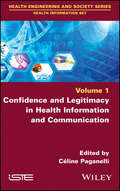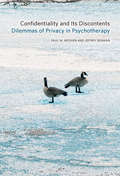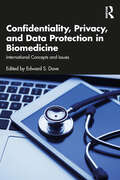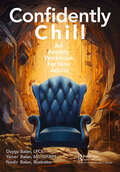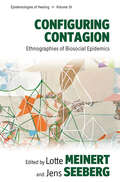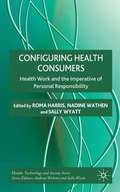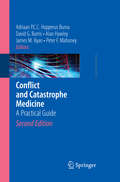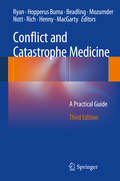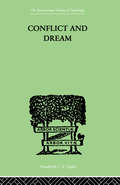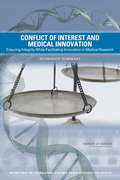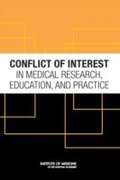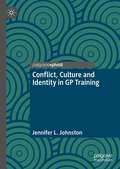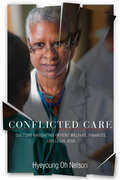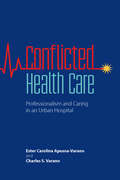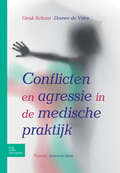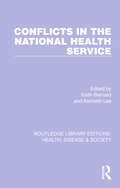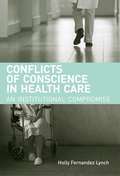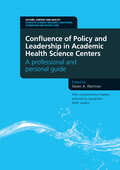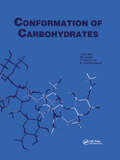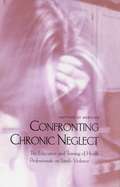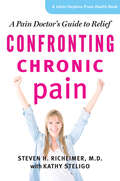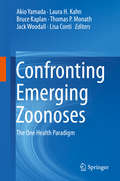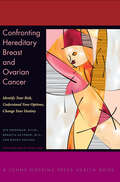- Table View
- List View
Confidence and Legitimacy in Health Information and Communication
by Ceiline PaganelliThe question of trust is crucial in the field of health. First, because health is indicative of particularly strong issues at the societal, regulatory, institutional or individual levels; secondly, because the boundaries between specialized information validated by legitimate instances and uncommitted information have become permeable; finally, because it appears to be central within relations between actors in the field. In this book, we propose to address the trust in terms of the information and communication phenomena that are at work in the health sector, and to look at the process of building the legitimacy of information in the health sector. health.
Confidentiality and Its Discontents: Dilemmas of Privacy in Psychotherapy (Psychoanalytic Interventions)
by Paul W. Mosher Jeffrey BermanFreud promised his patients absolute confidentiality, regardless of what they revealed, but privacy in psychotherapy began to erode a half-century ago. Psychotherapists now seem to serve as “double agents” with a dual and often conflicting allegiance to patient and society. Some therapists even go so far as to issue Miranda-type warnings, advising patients that what they say in therapy may be used against them.Confidentiality and Its Discontents explores the human stories arising from this loss of confidentiality in psychotherapy. Addressing different types of psychotherapy breaches, Mosher and Berman begin with the the story of novelist Philip Roth, who was horrified when he learned that his psychoanalyst had written a thinly veiled case study about him. Other breaches of privacy occur when the so-called duty to protect compels a therapist to break confidentiality by contacting the police. Every psychotherapist has heard about “Tarasoff,” but few know the details of this story of fatal attraction. Nor are most readers familiar with the Jaffee case, which established psychotherapist-patient privilege in the federal courts. Similiarly, the story of Robert Bierenbaum, a New York surgeon who was brought to justice fifteen years after he brutally murdered his wife, reveals how privileged communication became established in a state court. Meanwhile, the story of New York Chief Judge Sol Wachtler, convicted of harassing a former lover and her daughter, shows how the fear of the loss of confidentiality may prevent a person from seeking treatment, with potentially disastrous results.While affirming the importance of the psychotherapist-patient privilege, Confidentiality and Its Discontents focuses on both the inner and outer stories of the characters involved in noteworthy psychotherapy breaches and the ways in which psychiatry and the law can complement but sometimes clash with each other.
Confidentiality, Privacy, and Data Protection in Biomedicine: International Concepts and Issues
by Edward S. DoveFeaturing contributions from leading scholars of health privacy law, this important volume offers insightful reflection on issues such as confidentiality, privacy, and data protection, as well as analysis in how a range of jurisdictions—including the US, the UK, Europe, South Africa, and Australia—navigate a rapidly developing biomedical environment.While the collection of personal health information offers the potential to drive research and innovation, it also generates complex legal and ethical questions in how this information is used to ensure the rights and interests of individuals and communities are respected. But in many ways laws have struggled to keep pace with technological developments. This book therefore seeks to fill a lacuna for legal insight and reflection. Over three parts, the book first explores the conceptual landscape which law and legal institutions must contend, and then turns to examine practical issues such as the GDPR, secondary use of data for research, genomic research, and data trusts.With cutting-edge analysis drawing on domestic and international case law, legislation, and policy, this comprehensive volume will prove fascinating reading for all students and researchers interested in this evolving and contentious area of study.
Confidently Chill: An Anxiety Workbook for New Adults
by Nadir Balan Yener Balan Duygu BalanConfidently Chill is a groundbreaking two-book set comprising an evidence-based medical workbook and a captivating graphic novel.Delving into anxiety's societal, familial, and individual dimensions, this unique resource offers practical strategies rooted in empirical research, clinical methodologies, and psychological theory.Seamlessly blending medical expertise with award-winning artistry, Confidently Chill promises a holistic journey towards identity formation and lasting healing amidst today's unprecedented challenges.
Configuring Contagion: Ethnographies of Biosocial Epidemics (Epistemologies of Healing #19)
by Lotte Meinert Jens SeebergExpanding our understanding of contagion beyond the typical notions of infection and pandemics, this book widens the field to include the concept of biosocial epidemics. The chapters propose varied and detailed answers to questions about epidemics and their contagious potential for specific infections and non-infectious conditions. Together they explore how inseparable social and biological processes configure co-existing influences, which create epidemics, and in doing so stress the role of social inequality in these processes. The authors compellingly show that epidemics do not spread evenly in populations or through simple coincidental biological contagion: they are biosocially structured and selective, and happen under specific economic, political and environmental conditions. This volume illustrates that an understanding of biosocial factors is vital for ensuring effective strategies for the containment of epidemics.
Configuring Contagion: Ethnographies of Biosocial Epidemics (Epistemologies of Healing #19)
by Lotte Meinert Jens SeebergExpanding our understanding of contagion beyond the typical notions of infection and pandemics, this book widens the field to include the concept of biosocial epidemics. The chapters propose varied and detailed answers to questions about epidemics and their contagious potential for specific infections and non-infectious conditions. Together they explore how inseparable social and biological processes configure co-existing influences, which create epidemics, and in doing so stress the role of social inequality in these processes. The authors compellingly show that epidemics do not spread evenly in populations or through simple coincidental biological contagion: they are biosocially structured and selective, and happen under specific economic, political and environmental conditions. This volume illustrates that an understanding of biosocial factors is vital for ensuring effective strategies for the containment of epidemics.
Configuring Health Consumers
by Roma Harris Nadine Wathen Sally WyattThis book explore assumptions underpinning contemporary health policy discourses that emphasize personal responsibility for health, consider how they attach to changing information technologies, and discuss their influence on emerging forms of health 'work'.
Conflict and Catastrophe Medicine: A Practical Guide
by James Ryan David Burris Alan Hawley Adriaan Hopperus Buma Peter F. MahoneyA 'how-to' book for medical aid workers - doctors, nurses and paramedics - working in hostile environments (natural disasters, man-made disasters, conflict in all its forms and remote or austere industrial settings). This manual provides information on what is going on, how to get involved, how to get ready, guidance on what to do out there, and how to get home bridging the fields of medicine, nursing international relations, politics, economics and history.
Conflict and Catastrophe Medicine: A Practical Guide
by David Macgarty James M. Ryan Adriaan P.C.C. Hopperus Buma Charles W. Beadling Aroop Mozumder David M. Nott Norman M. Rich Walter HennyThe first edition of conflict and catastrophe was produced in 2002 and a second, successful edition, followed in 2009. The decision to produce these works sprung from painful problems experienced by colleagues and authors themselves during many humanitarian and related deployments. The guide for both editions was to provide, in one volume, an entry level text covering all aspects of deployment, with an emphasis on medicine and healthcare in these environments. This third revised, expanded and updated edition of Conflict and Catastrophe Medicine: A Practical Guide follows its successful predecessors in providing a framework for use by health professionals visiting a resource constrained environment. Encompassing problems brought about by local conflict or natural disasters, the book covers preparation, organisation, logistics, treatment of major trauma and medical emergencies, and the special problems of delivering medicine in a hostile environment. This book comprehensively tackles: Self-preparation of health professionals to face a range of medical and related problems which occur in hostile and remote environments; War and disaster medicine, covering acute management, rehabilitation, reconstruction and prevention; Bridging the fields of medicine, nursing, international relations, history, politics and economics. The book also touches on nutrition, infection, trauma, psychiatry and psychological medicine and training.
Conflict and Dream
by Rivers, W H RFirst Published in 1999. Routledge is an imprint of Taylor & Francis, an informa company.
Conflict of Interest and Medical Innovation: Workshop Summary
by Sarah H. BeachyScientific advances such as the sequencing of the human genome have created great promise for improving human health by providing a greater understanding of disease biology and enabling the development of new drugs, diagnostics, and preventive services. However, the translation of research advances into clinical applications has so far been slower than anticipated. This is due in part to the complexity of the underlying biology as well as the cost and time it takes to develop a product. Pharmaceutical companies are adapting their business models to this new reality for product development by placing increasing emphasis on leveraging alliances, joint development efforts, early-phase research partnerships, and public-private partnerships. These collaborative efforts make it possible to identify new drug targets, enhance the understanding of the underlying basis of disease, discover novel indications for the use of already approved products, and develop biomarkers for disease outcomes or directed drug use. While the potential benefits of collaboration are significant, the fact that the relationships among development partners are often financial means that it is vital to ensure trust by identifying, disclosing, and managing any potential sources of conflict that could create bias in the research being performed together. "Conflict of Interest and Medical Innovation" is the summary of a workshop convened by the Institute of Medicine Roundtable on Translating Genomic-Based Research for Health in June 2013 to explore the appropriate balance between identifying and managing conflicts of interest and advancing medical innovation. A wide range of stakeholders, including government officials, pharmaceutical company representatives, academic administrators and researchers, health care providers, medical ethicists, patient advocates, and consumers, were invited to present their perspectives and participate in discussions during the workshop. This report focuses on current conflict of interest policies and their effect on medical innovation in an effort to identify best practices and potential solutions for facilitating innovation while still ensuring scientific integrity and public trust.
Conflict of Interest in Medical Research, Education, and Practice
by Institute of MedicineCollaborations of physicians and researchers with industry can provide valuable benefits to society, particularly in the translation of basic scientific discoveries to new therapies and products. Recent reports and news stories have, however, documented disturbing examples of relationships and practices that put at risk the integrity of medical research, the objectivity of professional education, the quality of patient care, the soundness of clinical practice guidelines, and the public's trust in medicine. Conflict of Interest in Medical Research, Education, and Practice provides a comprehensive look at conflict of interest in medicine. It offers principles to inform the design of policies to identify, limit, and manage conflicts of interest without damaging constructive collaboration with industry. It calls for both short-term actions and long-term commitments by institutions and individuals, including leaders of academic medical centers, professional societies, patient advocacy groups, government agencies, and drug, device, and pharmaceutical companies. Failure of the medical community to take convincing action on conflicts of interest invites additional legislative or regulatory measures that may be overly broad or unduly burdensome. Conflict of Interest in Medical Research, Education, and Practice makes several recommendations for strengthening conflict of interest policies and curbing relationships that create risks with little benefit. The book will serve as an invaluable resource for individuals and organizations committed to high ethical standards in all realms of medicine.
Conflict, Culture and Identity in GP Training
by Jennifer L. JohnstonThis book explores the identity work and conflicted perspectives of general practitioner (GP) trainees working in hospitals in the UK. Drawing on empirical and theoretical scholarship, and privileging the analysis of social language-in-use, Johnston describes primary care medicine as a separate paradigm with its own philosophy, identity and practice. Casting primary and secondary care in historical conflict, the perceived lower status of primary care in the world of medicine is explored. Significant identity challenges ensue for GP trainees positioned at the coalface of conflict. Problematising structures of GP training and highlighting how complex historical power dynamics play out in medical training, the author advocates for radical change in how GPs are trained in order to manage the current primary care recruitment and retention crisis.
Conflicted Care: Doctors Navigating Patient Welfare, Finances, and Legal Risk
by Hyeyoung Oh NelsonAn eye-opening and compelling ethnography about how doctors make decisions The oath that doctors take to "do no harm" suggests that patient welfare is at the center of what it means to be a successful medical professional. It is also understood, however, that hospitals are not only vessels for medical care—they are businesses, educational institutions, and complex bureaucracies with intricate codes of etiquette that dictate how each staff member should approach situations with patients. In Conflicted Care, Hyeyoung Oh Nelson provides an in-depth look at the decision-making processes of physicians at a large, prestigious academic medical center—that she calls Pacific Medical Center—and finds that more often than not patient wellbeing is only one of several factors governing day-to-day decisions. The steps physicians take reveal a kind of hidden curriculum of the medical world, one that is guided by status and hierarchy, bureaucracy, norms for consulting with third-parties, regulations for interactions with patients, and medical uncertainty. While at an institutional and individual level patient care continues to be integral to everything the physicians do, they are forced to reconcile that vow with these other, often-conflicting internal logics. Harm, Nelson argues, is thus built into the practice of medicine in the United States. This harm can take the form of unnecessary treatments and consultations or inadequate treatment for pain to motivate specialist intervention that would otherwise be resisted. These and other practices have the overall consequence of significantly driving up inpatient care costs, which then results in patients forgoing needed, ongoing treatment once they receive their medical bills. Drawing on a deep ethnography of physicians in the Internal Medicine Service unit, Nelson offers a sharp assessment of current policies aimed at alleviating medical costs and explains why they are ineffective. She concludes by offering novel policy and practice recommendations for health care practitioners, policy makers, and healthcare institutions.
Conflicted Health Care: Professionalism and Caring in an Urban Hospital
by Ester Carolina Apesoa-Varano Charles S. VaranoAnyone who has spent time in a hospital as a patient or family member of a patient hopes that those who attend to us or our loved ones are at their professional best and that they care for us in ways that console us and preserve our dignity. This book takes an intimate look at how health care practitioners struggle to live up to their professional and caring ideals through (or during?) twelve-hour shifts on the hospital floor. From 3,200 hours of participant-observation and 500 hours of follow-up interviews with twenty-one doctors, thirty registered nurses, twenty-one respiratory therapists, twenty medical social workers, and eighteen occupational, physical, and speech therapists, the authors create a complex picture of the workplace conflicts that different types of health care practitioners face. Though all these groups espouse caring ideals, professional interests and a curative orientation dominate in patient care and interoccupational relations. Because emotive caring is not supported by the organization of health care in the hospital, it becomes an individual virtue that overworked staff find hard to perform, and it takes on an ideological form that obscures the status hierarchy among practitioners. Conflicts between practitioners rest upon the ranking of each group's knowledge base. They manifest in efforts to work as a team or set limits on practitioner responsibilities and in differing views on unionization.
Conflicted Health Care: Professionalism and Caring in an Urban Hospital
by Charles S. Varano Ester Carolina Apesoa-VaranoAnyone who has spent time in a hospital as a patient or family member of a patient hopes that those who attend to us or our loved ones are at their professional best and that they care for us in ways that console us and preserve our dignity. This book takes an intimate look at how health care practitioners struggle to live up to their professional and caring ideals through (or during?) twelve-hour shifts on the hospital floor. From 3,200 hours of participant-observation and 500 hours of follow-up interviews with twenty-one doctors, thirty registered nurses, twenty-one respiratory therapists, twenty medical social workers, and eighteen occupational, physical, and speech therapists, the authors create a complex picture of the workplace conflicts that different types of health care practitioners face. Though all these groups espouse caring ideals, professional interests and a curative orientation dominate in patient care and interoccupational relations. Because emotive caring is not supported by the organization of health care in the hospital, it becomes an individual virtue that overworked staff find hard to perform, and it takes on an ideological form that obscures the status hierarchy among practitioners. Conflicts between practitioners rest upon the ranking of each group's knowledge base. They manifest in efforts to work as a team or set limits on practitioner responsibilities and in differing views on unionization.
Conflicten en agressie in de medische praktijk
by Geuk Schuur Douwe VriesAgressief en zelfs gewelddadig gedrag van cliënten is een verschijnsel waarmee artsen en hun assisterende medewerkers helaas steeds vaker worden geconfronteerd - niet alleen in de poli of praktijkruimte, maar ook buiten werktijd. Deze overlast kan uiteenlopen van hinderlijk gedrag of verbale intimidatie tot grove beledigingen en zelfs lichamelijk geweld. Conflicten en agressie in de medische praktijk, geschreven voor huisartsen, medisch specialisten en hun assistenten, dient als een praktische handleiding om agressief gedrag te voorkomen of, als dit toch mocht optreden, het in te tomen. Daarnaast is dit boek geschikt voor overige beroepsbeoefenaren die contact hebben met zorgvragers, zoals bedrijfsartsen, apothekers of maatschappelijk werkers. De thema's in dit boek zijn in oplopende mate van ernst gerangschikt. Bij elk probleemsituatie wordt de vraag gesteld: hoe kan men bij de confrontatie zicht op de situatie krijgen, controle over eigen emoties en het eigen gedrag houden, de leiding behouden en van daaruit de-escalerend optreden? Doel is hierbij te leren de conflictsituatie te beheersen en deze een voor alle partijen constructieve, zinvolle wending te geven. De hoofdstukken in dit boek kennen een uniforme opbouw. Elk hoofdstuk begint met een casus, waarna overwegingen volgen. In het onderdeel 'Reflectie' wordt de beschreven reactie van de handelende beroepsbeoefenaren kritisch belicht. Elk hoofdstuk wordt met adviezen afgesloten.
Conflicts in the National Health Service (Routledge Library Editions: Health, Disease and Society #2)
by Keith BarnardOriginally published in 1977, this book explored some of the major problems besetting the Health Service during the second half of the twentieth century. Now, as then, they offer both historical perspective on contemporary difficulties and invite debate about the future development of health services. The main themes are the medical care system and its organisational structures; the managers and the providers of the system, their tasks and responses; the resources available whether financial, human or material; and finally the consumers and their influence upon the overall direction of the system.
Conflicts of Conscience in Health Care: An Institutional Compromise
by Holly Fernandez LynchIn Conflicts of Conscience in Health Care, Holly Fernandez Lynch finds a way around the polarizing rhetoric associated with this issue by proposing a compromise that protects both a patient access to care and a physician's ability to refuse.
Confluence of Policy and Leadership in Academic Health Science Centers: A Professional and Personal Guide
by Steven A. WartmanAcademic Health Science Centers are complex organizations with three principal functions: the education of the next generation of health professionals; the conduct of biomedical and clinical research that leads to new treatments and approaches to disease; and the delivery of comprehensive and advanced patient care. This is the first comprehensive book that describes in detail the knowledge and skill base necessary to successfully lead these complex organizations. Written by the world's leading authorities it combines the science of leadership, organizational structure, financial and personnel management, public relations and communications, trainee and student policy, community relations, and globalization. "This volume focuses on policy considerations that provide the foundation for AHSCs to thrive. While the legislation, challenges, and strategies will change over time, the need for strong policy to influence and guide organizational and individual behavior will not. AHSCs are complex organizations that must continue to evolve to face the multifactorial nature of health care problems. How they do so will depend to a great extent not only on having appropriate policies in place but also on their success in translating these policies into effective implementation." Andrew M. Ibrahim and M. Roy Wilson, in the Foreword
Conformation of Carbohydrates
by V. S. RaoThis text will give the reader a firm understanding of all aspects of carbohydrate conformation by describing and explaining the importance of interactions between carbohydrates and interactions of carbohydrates with proteins, nucleic acids or any other macromolecule., The authors have gathered a wealth of information on carbohydrate structures, different methods of conformational analysis, the role of carbohydrates as recognition molecules in biological systems and their industrial applications., Whether you are a student, teacher or a basic researcher, this text book is a ‘one-stop’ source of current information on carbohydrate conformation and the potential use of conformational properties in industry and also of their crucial role in important biological events such as cell-cell interaction, cell adhesion, cellular signaling mechanism.
Confronting Chronic Neglect: The Education and Training of Health Professionals on Family Violence
by Committee on the Training Needs of Health Professionals to Respond to Family ViolenceAs many as 20 to 25 percent of American adults or one in every four people have been victimized by, witnesses of, or perpetrators of family violence in their lifetimes.. Family violence affects more people than cancer, yet it's an issue that receives far less attention. Surprisingly, many assume that health professionals are deliberately turning a blind eye to this traumatic social problem.The fact is, very little is being done to educate health professionals about family violence. Health professionals are often the first to encounter victims of abuse and neglect, and therefore they play a critical role in ensuring that victims as well as perpetrators get the help they need. Yet, despite their critical role, studies continue to describe a lack of education for health professionals about how to identify and treat family violence. And those that have been trained often say that, despite their education, they feel ill-equipped or lack support from by their employers to deal with a family violence victim, sometimes resulting in a failure to screen for abuse during a clinical encounter.Equally problematic, the few curricula in existence often lack systematic and rigorous evaluation. This makes it difficult to say whether or not the existing curricula even works.Confronting Chronic Neglect offers recommendations, such as creating education and research centers, that would help raise awareness of the problem on all levels. In addition, it recommends ways to involve health care professionals in taking some responsibility for responding to this difficult and devastating issue.Perhaps even more importantly, Confronting Chronic Neglect encourages society as a whole to share responsibility. Health professionals alone cannot solve this complex problem. Responding to victims of family violence and ultimately preventing its occurrence is a societal responsibility
Confronting Chronic Pain: A Pain Doctor's Guide to Relief (A Johns Hopkins Press Health Book)
by Steven H. RicheimerA holistic approach to pain management from a recognized leader in the field.This comprehensive guide is designed to help everyone whose days are filled with chronic pain—the kind of pain that truly is a disease unto itself. Where does chronic pain come from, and why doesn’t it go away? Dr. Steven H. Richeimer, an eminent voice in the field of pain management, answers these and other fundamental questions about chronic pain. Board certified in pain medicine, anesthesiology, and psychiatry, he knows that the stress of persistent pain quickly takes a toll on the body and the mind. And he has helped thousands of people reduce their pain and reclaim their lives.In Confronting Chronic Pain, Dr. Richeimer discusses what causes pain in such disorders as arthritis, cancer, fibromyalgia, chronic headache, and back pain—and describes how to get relief. He provides clear and up-to-date information about pain medications, exercise and nutrition, injections and neurostimulators, and complementary therapies. He also explains the many approaches to managing the social and emotional aspects of pain.Understanding that chronic pain affects the spirit, he offers seven spiritual tools for moving beyond pain; understanding that chronic pain affects the whole family, he has created an action plan for family harmony; understanding the emotional component of people in pain, he helps them solve the chronic pain puzzle."Just learn to live with it" is not a satisfactory response to someone living with chronic pain. Dr. Richeimer’s compassionate and holistic approach can help soften the harsh edges of pain and provide hope for the future.
Confronting Emerging Zoonoses: The One Health Paradigm
by Bruce Kaplan Akio Yamada Laura H. Kahn Thomas P. Monath Jack Woodall Lisa ContiThis book provides readers with information on the factors underlying the emergence of infectious diseases originating in animals and spreading to people. The One Health concept recognizes the important links between human, animal, and environmental health and provides an important strategy in epidemic mitigation and prevention. The essential premise of the One Health concept is to break down the silos among the different health professions and promote transdisciplinary collaborations. These concepts are illustrated with in-depth analyses of specific zoonotic agents and with examples of the successes and challenges associated with implementing One Health. The book also highlights some of the challenges societies face in confronting several specific zoonotic diseases. A chapter is included on comparative medicine to demonstrate the broad scope of the One Health concept. Edited by a team including the One Health Initiative pro bono members, the book is dedicated to those studying zoonotic diseases and comparative medicine in both human and veterinary medicine, to those involved in the prevention and control of zoonotic infections and to those in the general public interested in the visionary field of One Health.
Confronting Hereditary Breast and Ovarian Cancer: Identify Your Risk, Understand Your Options, Change Your Destiny (A Johns Hopkins Press Health Book)
by Sue Friedman Rebecca Sutphen Kathy Steligo"Be informed. Be empowered. Be well."If you are concerned that the cancer in your family is hereditary, you face difficult choices. Should you have a blood test that may reveal whether you have a high likelihood of disease? Do you preemptively treat a disease that may never develop? How do you make decisions now that will affect the rest of your life? This helpful, informative guide answers your questions as you confront hereditary breast and ovarian cancer.Developed by Facing Our Risk of Cancer Empowered (FORCE), the nation’s only nonprofit organization dedicated to supporting families affected by hereditary breast and ovarian cancer, this book stands alone among breast and ovarian cancer resources. Equal parts health guide and memoir, it defines complex issues facing previvors and survivors and provides solutions with a fresh, authoritative voice.Written by three passionate advocates for the hereditary cancer community who are themselves breast cancer survivors, Confronting Hereditary Breast and Ovarian Cancer dispels myths and misinformation and presents practical risk-reducing alternatives and decision-making tools. Including information about genetic counseling and testing, preventive surgery, and fertility and family planning, as well as explanations of health insurance coverage and laws protecting genetic privacy, this resource tackles head-on the challenges of living in a high-risk body.Confronting hereditary cancer is a complex, confusing, and highly individual journey. With its unique combination of the latest research, expert advice, and compelling personal stories, this book gives previvors, survivors, and their family members the guidance they need to face the unique challenges of hereditary cancer.
